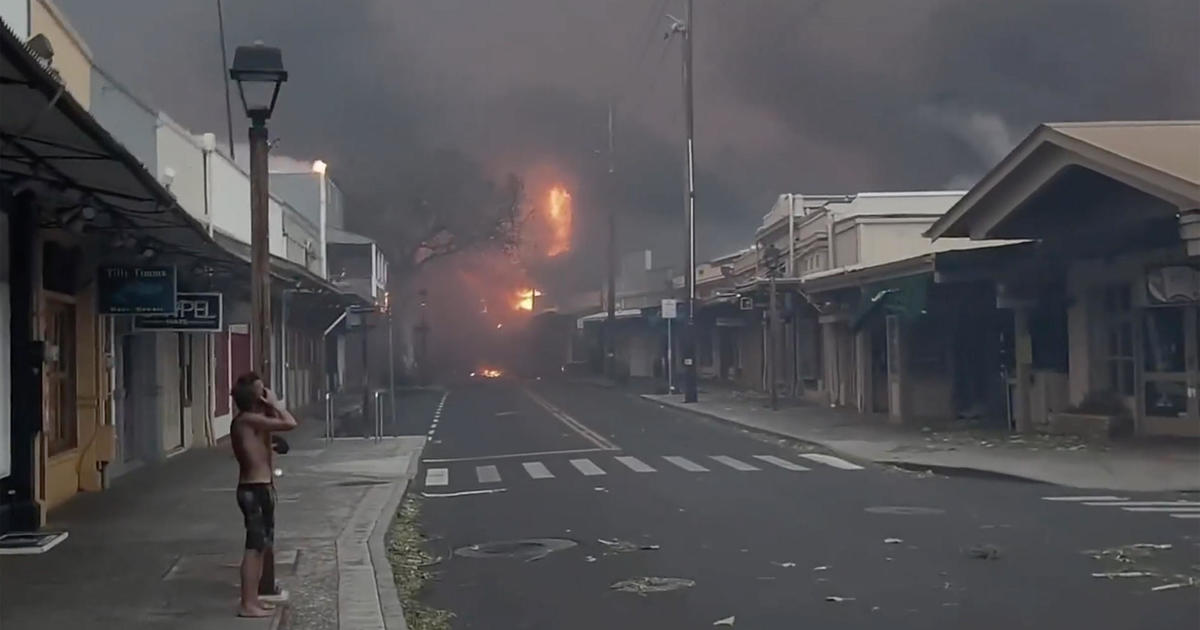
Hawaii is a noted tourist destination, but with deadly wildfires wreaking havoc on Maui and other islands, the state has declared a state of emergency in all counties. Hawaiian officials are discouraging non-essential travel to Maui amidst the fire’s destruction on that island.
Major airlines are assisting in efforts to evacuate residents and visitors already located in danger zones, and people with trips planned to Maui are being asked to postpone them, with airlines and accommodation providers offering travelers flexibility to rebook.
Here’s what to know if you had a vacation in Hawaii scheduled.
What parts of Hawaii are experiencing fires?
According to local news outlet Hawaii News Now, there are “several out-of-control wildfires on Maui and Hawaii Island.”
On Maui, the deadly wildfires are currently ablaze in Lahaina, Kihei and Upcountry Maui. The northwest part of the Island of Hawaii, between Hapuna and Kawaihae, is also affected.
Can I still go to Maui?
The Hawaii Tourism Agency is strongly discouraging non-essential travel to Maui. Even tourists who are already there are encouraged to depart immediately, if they can.
“Visitors currently on Maui for non-essential travel reasons are being asked to leave the island as rescue and recovery efforts continue,” the Hawaii Tourism Agency said in a statement Wednesday.
Travel to the island of Hawaii remains unaffected, and the government said it remains to safe to visit other islands.
Are commercial airlines flying to Maui?
Many airlines are offering travel waivers that allow customers with immediate plans to travel to Maui to rebook their flights without fees, or to cancel them altogether for credit or, in some cases, a full refund.
In 2020, airlines loosened their flight change policies to better accommodate passengers affected by Covid-19-related disruptions.
“With the exception of basic economy tickets, almost all U.S. airlines allow you flexibility to either reschedule your trip or cancel and get the full amount you paid back for travel credit for future trip,” Scott Keyes, of travel site Going told CBS MoneyWatch. “So you automatically have a lot of flexibility to change your plans or save flight credit for a future trip. That was not really the case pre-pandemic.”
United Airlines said it’s prioritizing the welfare of its employees on Maui and has scrapped commercial flights to the island. It is instead using empty passenger planes to carry Maui residents off the island.
“We’ve cancelled today’s inbound flights to Kahului Airport so our planes can fly empty to Maui and be used as passenger flights back to the mainland,” the airline said in a statement to CBS MoneyWatch.
The airline also has waivers in place for United passengers who had been scheduled to fly to or from Kahului airport on Maui, as well as Honolulu airport.
Customers may either rebook themselves on a flight that departs on or before Aug. 16, or cancel the flight altogether for a full refund, the airline said on its website.
For its part, American Airlines said on Thursday that it planned to operate all scheduled flights to and from Maui. The airline is also allowing customers whose travel is affected by the wildfires to rebook without fees or to cancel and receive a full refund.
Alaska Air, has a “flexible travel policy” in place that allows customers to change their flights at no cost through Aug. 31 or cancel them in exchange for a travel voucher worth the cost of the flight.
Some would-be visitors to Maui said on X, the social media platform formerly known as Twitter, that they wanted outright refunds from airlines, as opposed to the option to rebook within a short time frame, given the extent of devastation the wildfires have caused.
Even if some flights are taking off, “we have nowhere to stay as our hotel was on the west Maui in Lahaina,” said one frustrated traveler.
Southwest Airlines said it had added flights between islands and back to the mainland U.S. “to keep people and supplies moving.” Some fares from Maui to the mainland U.S. are under $100.
Hawaiian Airlines also said it’s adding extra flights between Maui and Honolulu for as little as $19 “to facilitate urgent travel.”
The Hawaii Tourism Agency added that “airlines are being very supportive during this emergency crisis and providing additional flights to help visitors depart from Maui. Airlines are also adjusting their travel schedules to support those visitors who had planned to arrive this week.”
Will I be compensated for my accommodations?
Many major hotels and resorts in vulnerable areas have lost power, halted service and stopped accepting guests altogether.
The Hyatt Regency Maui Resort and Spa said the hotel is “closed to arrivals and not accepting guests” through Aug. 13. It will issue refunds including for deposits and prepayments to guests who had been scheduled to stay at the property through the weekend.
Homesharing site Airbnb said its extenuating circumstances policy has gone into effect for parts of Hawaii, including all of Maui. It allows hosts and guests to cancel their stays without penalty and entitles guests to full refunds for reservations they don’t use.
What if I bought travel insurance?
In the case of non-refundable reservations, a travel insurance policy could help you recoup funds related to a trip you didn’t take.
For travelers already on Maui, some of these policies also come with medical evacuation options that can help visitors to the island get to safer grounds.
Some credit card companies even build in protections related to travel too, without requiring that you sign up for additional protections.
“Many of them automatically include travel insurance, so check and see what you’re entitled to,” Keyes said.
—With reporting by Elizabeth Napolitano
